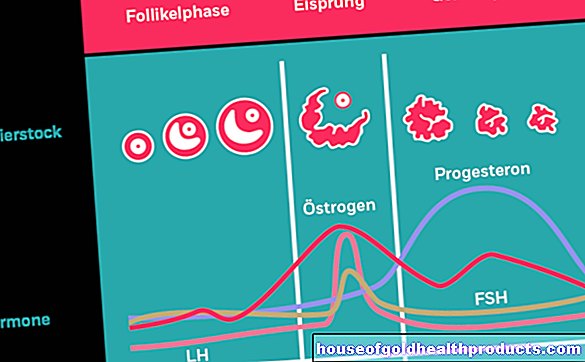Sars-CoV-2: Older people are not infected faster
Christiane Fux studied journalism and psychology in Hamburg. The experienced medical editor has been writing magazine articles, news and factual texts on all conceivable health topics since 2001. In addition to her work for, Christiane Fux is also active in prose. Her first crime novel was published in 2012, and she also writes, designs and publishes her own crime plays.
More posts by Christiane Fux All content is checked by medical journalists.Covid-19 is much more fatal in older people than in younger people. The good news, however, is that you are no more susceptible to the disease.
In the pandemic, the elderly are of particular concern: a particularly large number of them develop severe symptoms, they have to be ventilated more frequently - and their age group by far has the most deaths worldwide.
This also applies to Germany: According to data from the Robert Koch Institute, 63 percent of German Covid 19 deaths were older than 80 years, 32 percent were between 60 and 80 years old. Only five percent were younger than 60 years (as of October 14, 2020).
In view of such numbers, it would be particularly fatal if the susceptibility to becoming infected at all increased with age.
Comparison of data from Japan, Italy and Spain
Japanese scientists led by Ryosuke Omori from the University of Hokkaido have examined the relationship between age and susceptibility using data from Italy, Spain and Japan - all countries for which well-documented and publicly available data on the Sars-CoV-2 pandemic are available.
"Interestingly, the age distribution of mortality from Covid-19 in Italy, Japan and Spain is quite similar," the researchers write.
There were differences in the death rate - the number of deaths per 100,000 population. It reflects how active the disease is in a region. In May 2020, the death rate was 382 for Italy, 507 for Spain and 13 for Japan.
Calculation of susceptibility by age group
For their assessment, the scientists developed a mathematical model that could be used to calculate the susceptibility to Sars-CoV-2 infection in each age group under different conditions.
In doing so, they also took into account the estimated number of contacts of the age groups, which is different in size in the three countries. This also applied to the influence of the measures to contain the pandemic, which had different effects on behavior outside the home in different countries.
Susceptibility to infection does not depend on age
The results show that susceptibility to Sars-CoV-2 infection was the same in all age groups. In the same situation and under the same conditions, old people are not infected more easily than younger ones. The high proportion of elderly people who have died from Covid-19 is therefore primarily due to the fact that they become more seriously ill.
"Although we cannot completely rule out age dependency in terms of susceptibility, our results suggest that age-dependent severity is a major contributor to the observed age distribution in mortality," the researchers said.
The risk of death increases exponentially with age
Even at the beginning of the pandemic, researchers observed that the risk of death from Covid-19 increases rapidly due to age: If the disease is fatal in only 0.006 percent of cases in under 35-year-olds, the risk of dying after an infection is between 50 and 50 64-year-olds with 0.14 percent already significantly higher. Then it rises rapidly: between the ages of 75 and 84, 7.4 percent of the sick die, and from the age of 85, 22.5 percent, more than every fifth patient dies.
Weaker immune system, more previous illnesses
There are several possible explanations for this. On the one hand, the defenses that can suppress the virus are less powerful with age. On the other hand, there is an increased likelihood of previous illnesses such as diabetes, high blood pressure or obesity, which additionally increase the risk of fatal courses.
Protecting old people without isolating them
Protecting elderly people, who are often seriously ill, is currently a key challenge in the pandemic. In the beginning, old people's homes were strictly sealed off, but in view of the increasing number of infections, new strategies are currently being sought to protect the elderly without isolating them too much again.
Tags: therapies pregnancy magazine





























